Abstract
The purpose of this study was to obtain a socioeconomic/health profile of a select group of executive women, to understand more about their personal and professional lives, and to examine how these factors relate to their overall health. The data were obtained from a self-administered 73-item questionnaire that was mailed during spring 1987 to the 1,000 members of a professional executive women's organization with 15 chapters across the United States. Findings suggest that the women in executive positions do not necessarily compromise their health. In comparison with a group of age/gender/education matched working women, the overall wellness and risk assessment scores were remarkably similar. The study group, however, reported greater life satisfaction, stronger social support, and excellent health status; the overwhelming majority was satisfied with their personal and professional lives and believed that they were in control of both. This perception, coupled with the relatively high wellness scores, suggests that on average this group of executives may be in better health than had been predicted as women rose to executive positions within organizations.
Full text
PDF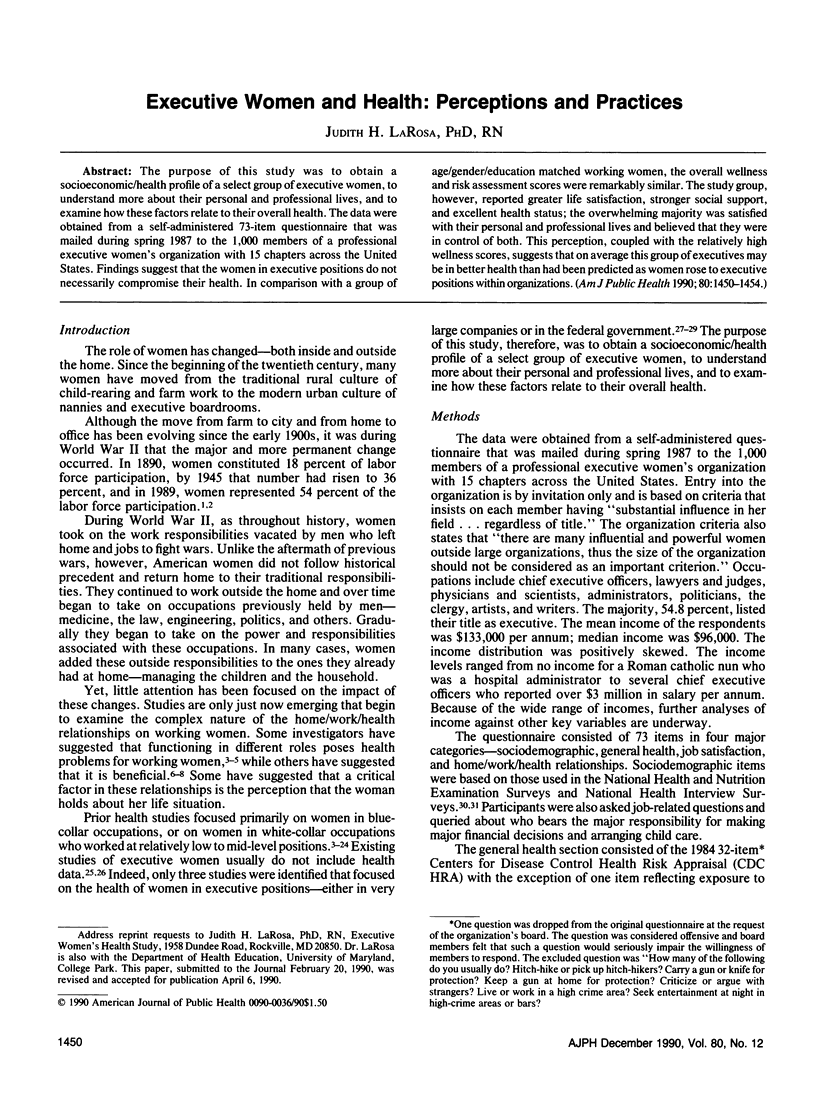
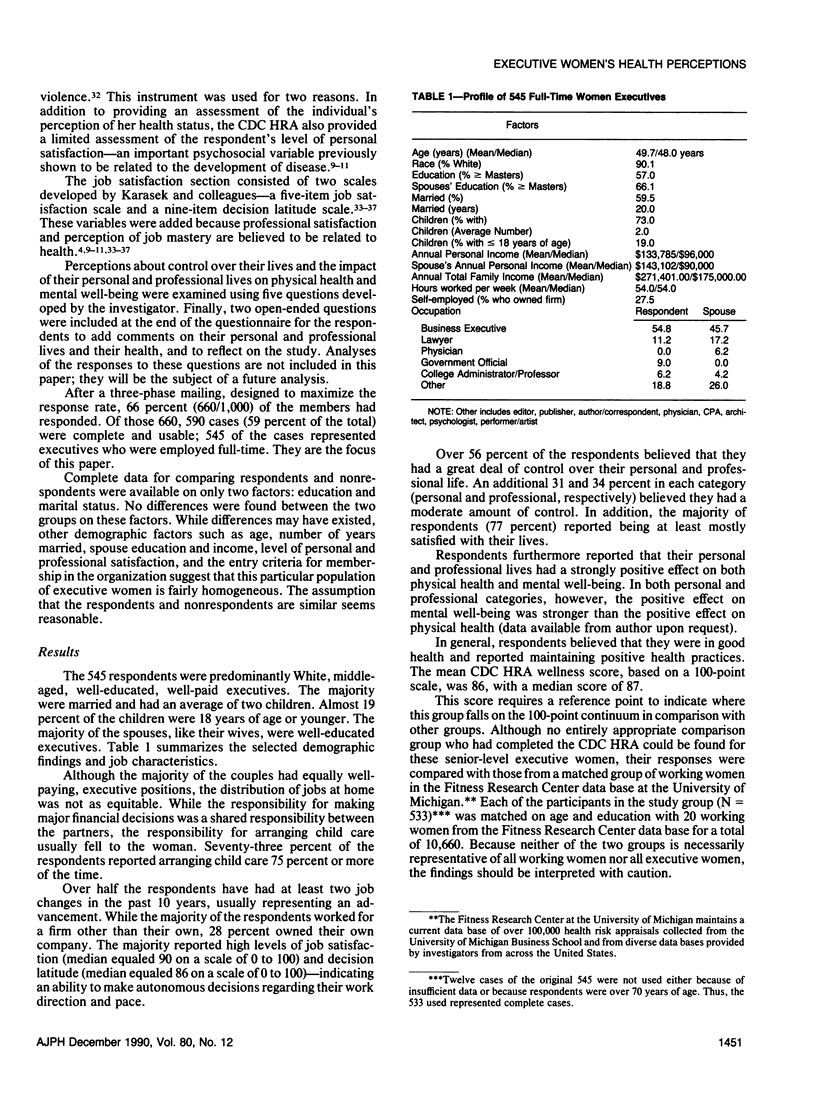
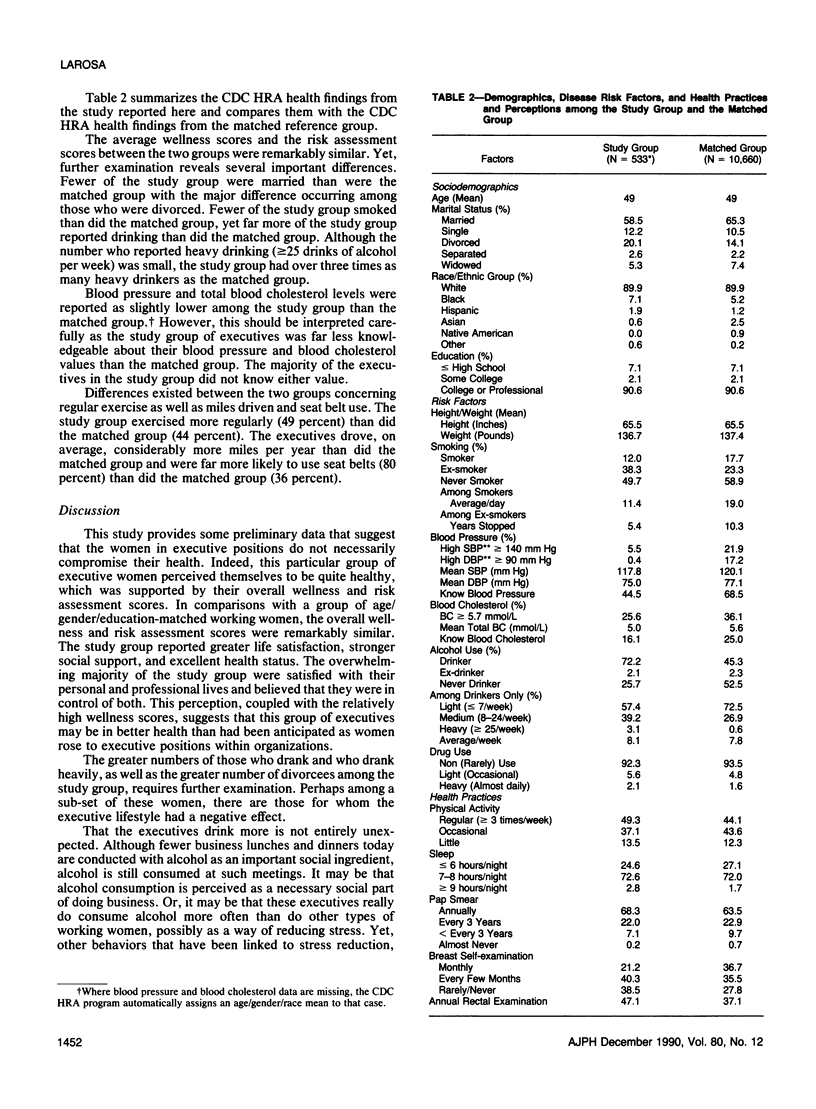
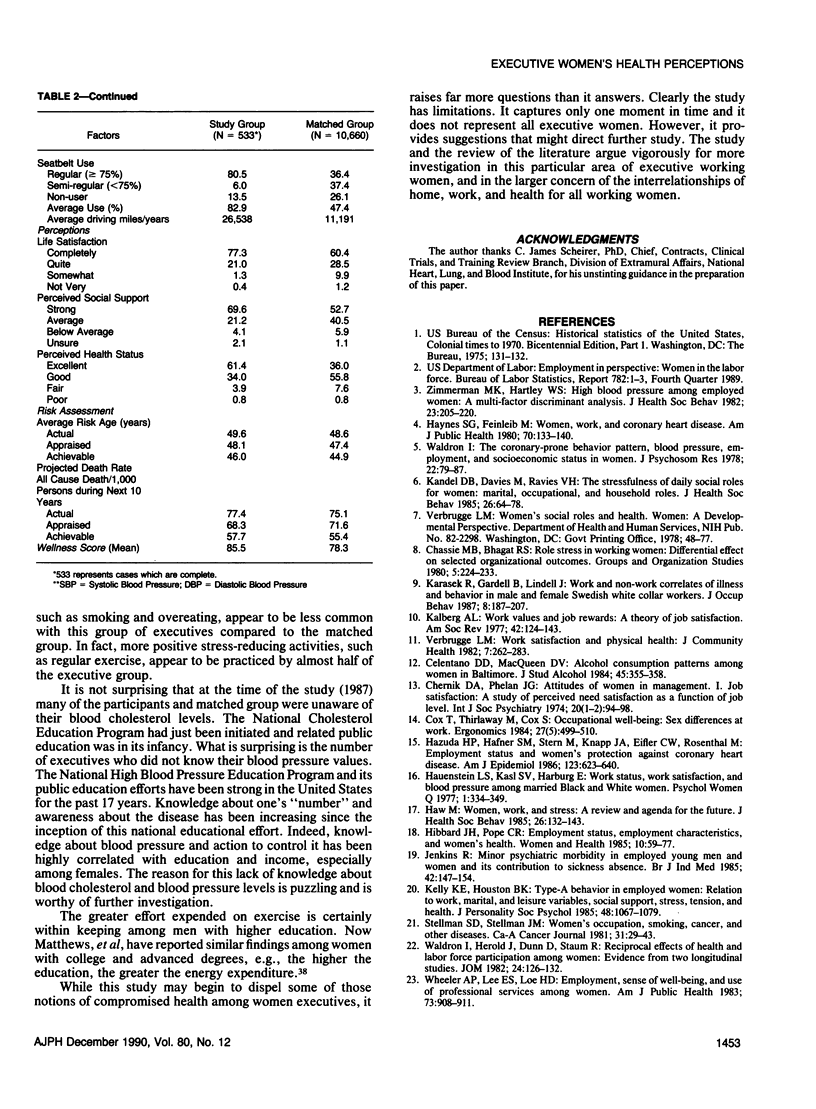
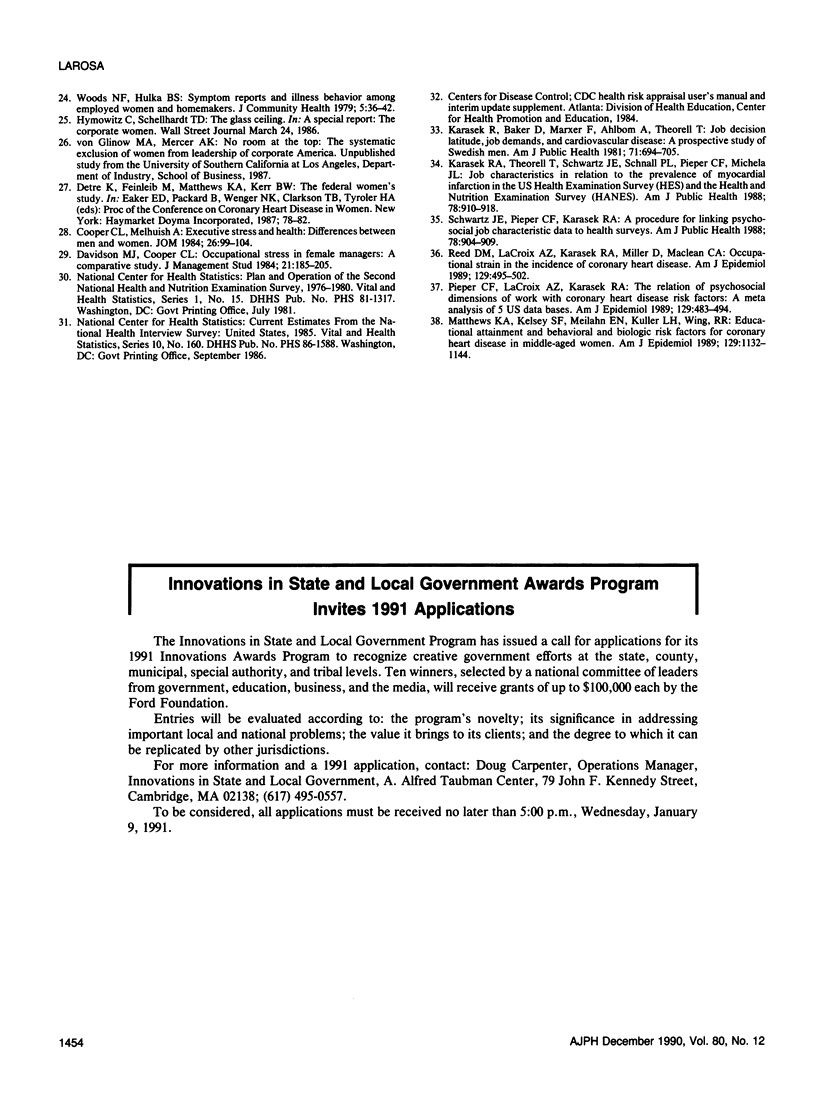
Selected References
These references are in PubMed. This may not be the complete list of references from this article.
- Celentano D. D., McQueen D. V. Alcohol consumption patterns among women in Baltimore. J Stud Alcohol. 1984 Jul;45(4):355–358. doi: 10.15288/jsa.1984.45.355. [DOI] [PubMed] [Google Scholar]
- Chernik D. A., Phelan J. G. Attitudes of women in management. I. Job satisfaction: a study of perceived need satisfaction as a function of job level. Int J Soc Psychiatry. 1974 Spring-Summer;20(1-2):94–98. doi: 10.1177/002076407402000114. [DOI] [PubMed] [Google Scholar]
- Cooper C. L., Melhuish A. Executive stress and health. Differences between men and women. J Occup Med. 1984 Feb;26(2):99–104. [PubMed] [Google Scholar]
- Cox T., Thirlaway M., Cox S. Occupational well-being: sex differences at work. Ergonomics. 1984 May;27(5):499–510. doi: 10.1080/00140138408963518. [DOI] [PubMed] [Google Scholar]
- Haynes S. G., Feinleib M. Women, work and coronary heart disease: prospective findings from the Framingham heart study. Am J Public Health. 1980 Feb;70(2):133–141. doi: 10.2105/ajph.70.2.133. [DOI] [PMC free article] [PubMed] [Google Scholar]
- Hazuda H. P., Haffner S. M., Stern M. P., Knapp J. A., Eifler C. W., Rosenthal M. Employment status and women's protection against coronary heart disease. Findings from the San Antonio Heart Study. Am J Epidemiol. 1986 Apr;123(4):623–640. doi: 10.1093/oxfordjournals.aje.a114282. [DOI] [PubMed] [Google Scholar]
- Hibbard J. H., Pope C. R. Employment status, employment characteristics, and women's health. Women Health. 1985 Spring;10(1):59–77. doi: 10.1300/J013v10n01_05. [DOI] [PubMed] [Google Scholar]
- Jenkins R. Minor psychiatric morbidity in employed young men and women and its contribution to sickness absence. Br J Ind Med. 1985 Mar;42(3):147–154. doi: 10.1136/oem.42.3.147. [DOI] [PMC free article] [PubMed] [Google Scholar]
- Kandel D. B., Davies M., Raveis V. H. The stressfulness of daily social roles for women: marital, occupational and household roles. J Health Soc Behav. 1985 Mar;26(1):64–78. [PubMed] [Google Scholar]
- Karasek R. A., Theorell T., Schwartz J. E., Schnall P. L., Pieper C. F., Michela J. L. Job characteristics in relation to the prevalence of myocardial infarction in the US Health Examination Survey (HES) and the Health and Nutrition Examination Survey (HANES). Am J Public Health. 1988 Aug;78(8):910–918. doi: 10.2105/ajph.78.8.910. [DOI] [PMC free article] [PubMed] [Google Scholar]
- Karasek R., Baker D., Marxer F., Ahlbom A., Theorell T. Job decision latitude, job demands, and cardiovascular disease: a prospective study of Swedish men. Am J Public Health. 1981 Jul;71(7):694–705. doi: 10.2105/ajph.71.7.694. [DOI] [PMC free article] [PubMed] [Google Scholar]
- Kelly K. E., Houston B. K. Type A behavior in employed women: relation to work, marital, and leisure variables, social support, stress, tension, and health. J Pers Soc Psychol. 1985 Apr;48(4):1067–1079. doi: 10.1037//0022-3514.48.4.1067. [DOI] [PubMed] [Google Scholar]
- Matthews K. A., Kelsey S. F., Meilahn E. N., Kuller L. H., Wing R. R. Educational attainment and behavioral and biologic risk factors for coronary heart disease in middle-aged women. Am J Epidemiol. 1989 Jun;129(6):1132–1144. doi: 10.1093/oxfordjournals.aje.a115235. [DOI] [PubMed] [Google Scholar]
- Pieper C., LaCroix A. Z., Karasek R. A. The relation of psychosocial dimensions of work with coronary heart disease risk factors: a meta-analysis of five United States data bases. Am J Epidemiol. 1989 Mar;129(3):483–494. doi: 10.1093/oxfordjournals.aje.a115159. [DOI] [PubMed] [Google Scholar]
- Reed D. M., LaCroix A. Z., Karasek R. A., Miller D., MacLean C. A. Occupational strain and the incidence of coronary heart disease. Am J Epidemiol. 1989 Mar;129(3):495–502. doi: 10.1093/oxfordjournals.aje.a115160. [DOI] [PubMed] [Google Scholar]
- Schwartz J. E., Pieper C. F., Karasek R. A. A procedure for linking psychosocial job characteristics data to health surveys. Am J Public Health. 1988 Aug;78(8):904–909. doi: 10.2105/ajph.78.8.904. [DOI] [PMC free article] [PubMed] [Google Scholar]
- Stellman S. D., Stellman J. M. Women's occupations, smoking, and cancer and other diseases. CA Cancer J Clin. 1981 Jan-Feb;31(1):29–43. doi: 10.3322/canjclin.31.1.29. [DOI] [PubMed] [Google Scholar]
- Verbrugge L. M. Work satisfaction and physical health. J Community Health. 1982 Summer;7(4):262–283. doi: 10.1007/BF01318959. [DOI] [PubMed] [Google Scholar]
- Waldron I., Herold J., Dunn D., Staum R. Reciprocal effects of health and labor force participation among women: evidence from two longitudinal studies. J Occup Med. 1982 Feb;24(2):126–132. [PubMed] [Google Scholar]
- Waldron I. The coronary-prone behavior pattern, blood pressure, employment and socio-economic status in women. J Psychosom Res. 1978;22(2):79–87. doi: 10.1016/0022-3999(78)90033-8. [DOI] [PubMed] [Google Scholar]
- Wheeler A. P., Lee E. S., Loe H. D., Jr Employment, sense of well-being, and use of professional services among women. Am J Public Health. 1983 Aug;73(8):908–911. doi: 10.2105/ajph.73.8.908. [DOI] [PMC free article] [PubMed] [Google Scholar]
- Woods N. F., Hulka B. S. Symptom reports and illness behavior among employed women and homemakers. J Community Health. 1979 Fall;5(1):36–45. doi: 10.1007/BF01321569. [DOI] [PubMed] [Google Scholar]
- Zimmerman M. K., Hartley W. S. High blood pressure among employed women: a multi-factor discriminant analysis. J Health Soc Behav. 1982 Sep;23(3):205–220. [PubMed] [Google Scholar]


